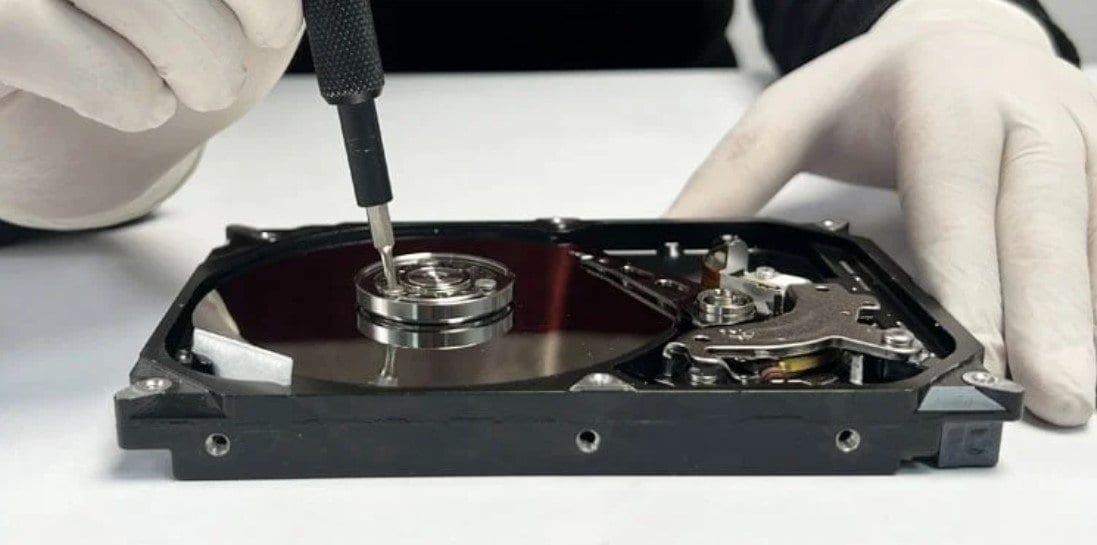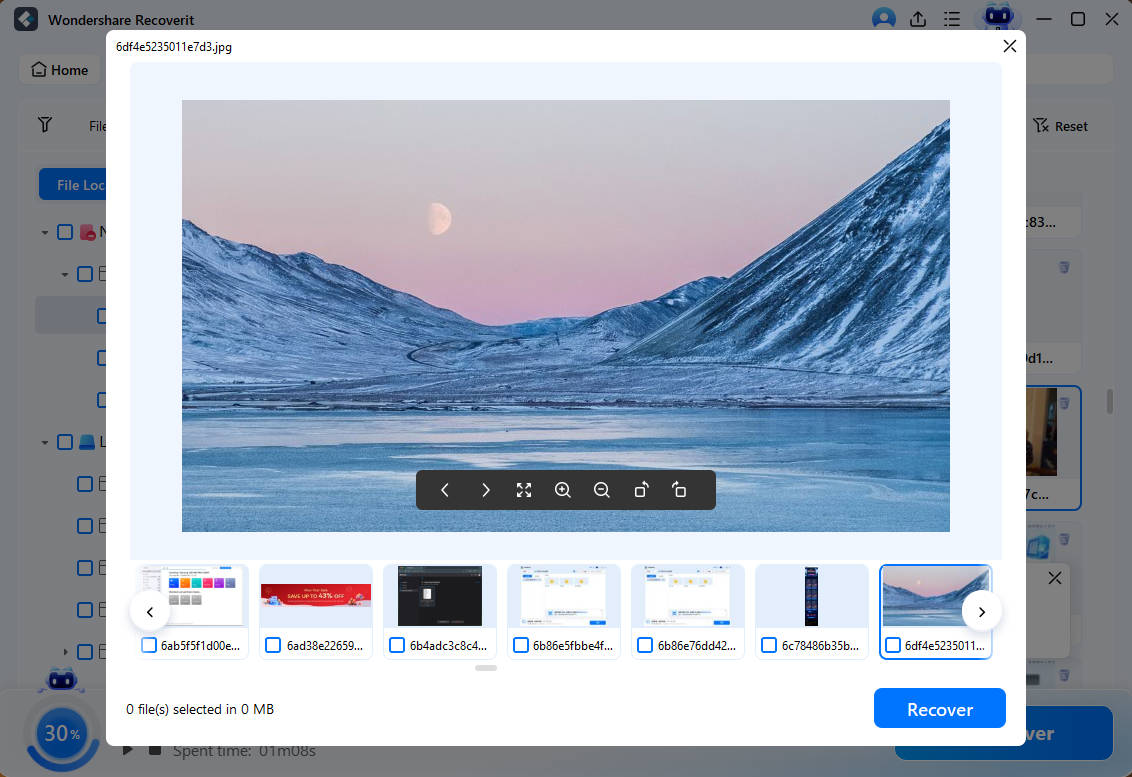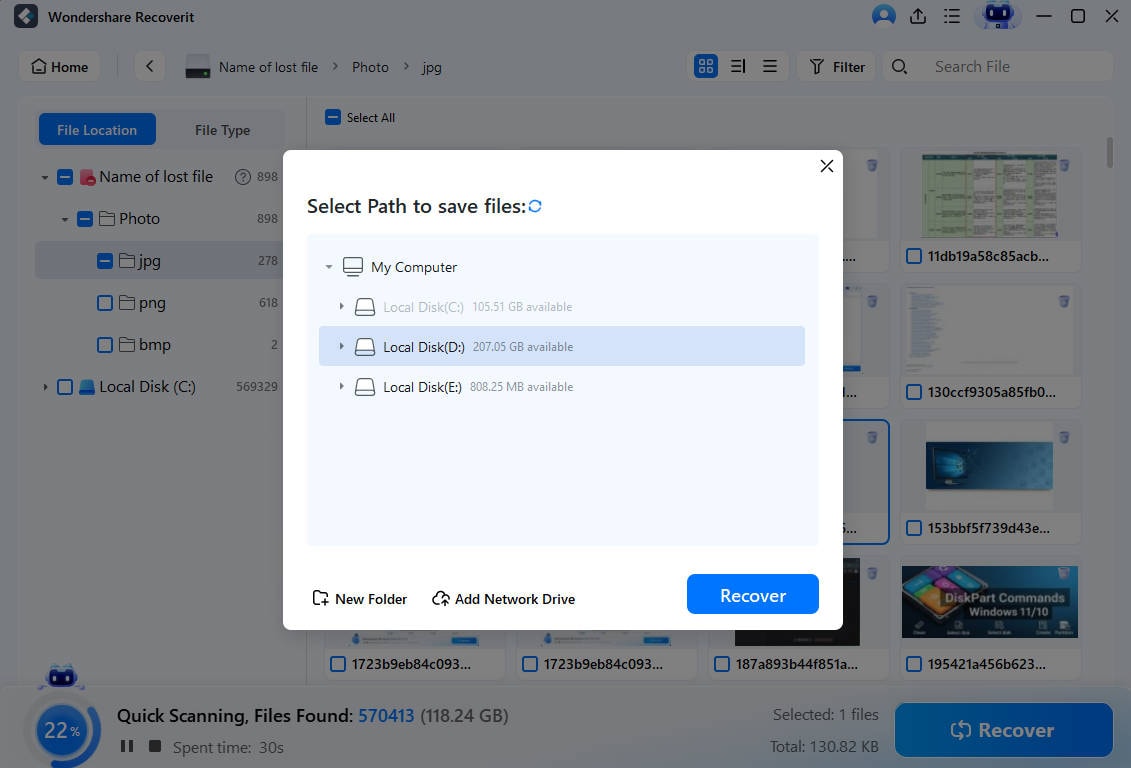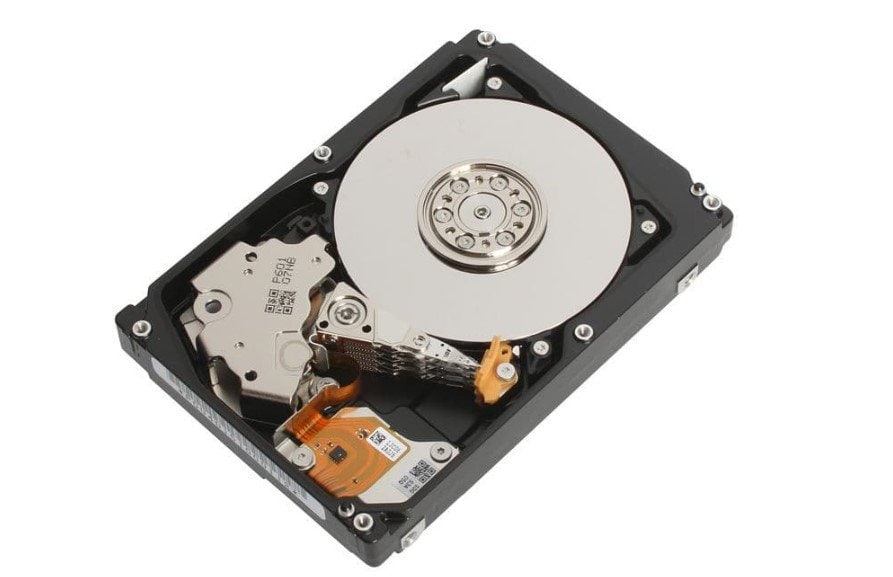Much like any machine, hard drives are prone to reach the end of a usage cycle and die out for various reasons. However, you may still need to recover data from dead hard drive that remains vital for specific purposes. If you've encountered such a scenario, then this is the perfect guide for you. Give it a light reading, and you'll learn why hard drives die or get damaged and a few proven ways for dead hard drive recovery. Additionally, you'll learn how to repair dead hard drives.
Table of Content
When Is Dead Hard Drive Recovery Possible?

Hard drives work by rotating magnetic platters to store and locate your data, which means there are many moving parts that can cause damage to your hard drive. The damage can be physical or logical. Physical damage happens when some of the platters inside of it get damaged. Logical damage usually involves hard disk corruption.
Besides those, your hard disk can get damaged by viruses or malware. They can attack your hard drive data or format it. When is data recovery possible? You can retrieve your data using data recovery software if your hard disk has suffered logical damage or virus attacks.
You can also use data recovery software to restore data from a hard disk that suffered minor physical damage that doesn't affect the disk sectors. However, if it suffered severe physical damage or is dead and undetectable, you'll need to contact a professional hard drive recovery service.
Several Unmistakable Symptoms of a Dying Hard Drive
Hard drives can die due to various reasons. These reasons include manufacturer faults, unreliable power sources, lousy ventilation, wrong operating system installation, improper voltage, etc. The reasons are countless, and you can't prevent them all. However, you can notice the symptoms of a dying hard disk and act accordingly to protect your data.
The symptoms of physical hard drive damage include:
- Strange clicking and whirring noises;
- Overheating;
- Stuck spindle motor;
- Inability to boot;
- Blue screen;
- Frequent error messages.
The symptoms of logical hard drive damage include:
- Disappearing files and folders;
- The operating system won't boot;
- The system crashes and freezes;
- Disk errors;
- Frequent error messages;
- S.M.A.R.T. monitoring displays issues.
Three Ways to Recover Files From a Dead Hard Drive
If your hard drive suffers from logical damage and is dying, you can recover your data using the following methods. However, if it's severely physically damaged, we strongly suggest you contact a reliable data recovery service and let the professionals help you recover data from your physically damaged hard drive.
On the other hand, before we start with data recovery steps, we also suggest you stop using your damaged or dead hard drive as soon as you notice it's damaged to avoid overwriting your lost data. If you continue using it as usual, you risk losing your precious data.
Way 1. Recover Data From Dead Hard Drive Using Wondershare Recoverit [Recommended]
The most reliable way to recover damaged hard drive data is using a professional data recovery software, and Wondershare Recoverit is an excellent choice for this purpose. Trusted by millions of users worldwide, Recoverit offers a comprehensive and user-friendly solution for retrieving lost or inaccessible data from various types of storage devices, including hard drives, SSDs, USB drives, and more.
If you want to recover lost data from your damaged hard drive using Wondershare Recoverit, follow these steps:
- Connect your dead hard disk to your PC and make sure it's recognized.
- Open Wondershare Recoverit. Select your hard disk in the Hard Drives and Locations section.

- This will automatically start the scan of your damaged hard disk.

- Preview the found files when the program finishes scanning your hard drive.

- If you're satisfied with the files, select the ones you want to retrieve and click Recover.

Recoverit hard drive data recovery offers incredible features, advanced scanning algorithms, and a user-friendly interface. It can recover lost data from dead external, internal, and NAS hard drives in just a few clicks.
Way 2. Head Straight to Recycle Bin
If your hard drive is damaged or dead, it can perform actions without your authorization, which means that it can sometimes delete files and folders from your hard drive. Therefore, if you notice your files are missing from your damaged hard disk, check the Recycle Bin may surprise you.
To recover data from your Recycle Bin, follow these steps:
- Open Recycle Bin from Desktop.

- Find the file you want to restore. Right-click on it and click Restore to recover your deleted files to the location they have been deleted from.

- If you want to recover your files from the Recycle Bin to a different location, click and drag your deleted files to a location of your choice.
Way 3. Restore From an Active Backup
Wondershare Recoverit can help you recover files from dead or damaged hard drives that haven't been backed up. However, if you've made a backup of your hard drive data before it got lost due to its damage, you can recover it there. Windows users often use File History to back up and recover their data.
File History frequently backs up every small change to your hard drive data. Moreover, it allows you to recover individual files instead of all data from a hard drive. That way, you can select the data you need and recover it separately. Follow these steps to recover data from File History:
- Open Settings on your computer.
- Scroll to the Update & Security section and click Backup in the left-side menu.
- Then, click on More Options in the Back up using File History section.

- In the pop-up window, click on Restore files from a current backup.
- Select the files you want to recover from your damaged or dead hard disk.
- When you've selected all the files you need, click the green Restore button. You can also right-click on the Restore button and select Restore to… to set the new location for your recovered data.

Can You Repair a Dead/Damaged Hard Drive at Home?
Now that we've covered how to recover your lost data, what can you do with your damaged hard drive? If your hard disk has been physically damaged, the only way to repair it is to contact professional services and let them help you. Even then, the recovery is not guaranteed. However, if your hard disk is logically damaged or corrupted, you can repair it in a few ways at home to regain its usability.
Way 1. Repair the Dead Hard Drive Using Windows System File Checker
Your hard disk could malfunction because it's corrupted or has bad sectors. You can use Windows System File Checker (SFC) to check that. System File Checker is a built-in feature that comes with Windows OS and allows you to scan your hard drive for damaged system files and recover them. To repair your damaged hard drive using the Windows SFC utility, follow these steps:
- Press Windows + X to open the Windows menu and select Windows PowerShell (Admin).

- Type in the following command and press Enter:
dism.exe /Online /Cleanup-image /Restorehealth.
- When it's done pulling the files that fix corruptions, type this command and press Enter:
sfc /scannow. It will scan and replace the corrupted system files with working ones.
Way 2. Scan and Fix the Dead Hard Drive Using CMD
Another way to repair a damaged or dead hard drive is with the command chkdsk. You can do that through the Command Prompt. Command Prompt helps you repair damaged and crashed hard drives in a few minutes. Unfortunately, it doesn't have a graphic interface, so follow these steps to scan and fix your damaged hard disk with chkdsk successfully:
- Press the Windows key and search for CMD.
- Click on Command Prompt and select Run as administrator.

- In the command window, type in the following command in the command window:
chkdsk *: /f(replace * with the drive letter assigned to your damaged hard disk).
chkdsk * - CheckDisk command scans your damaged hard disk and detects problems.
/f - F command fixes errors on your damaged or dead hard drive
Way 3. Send the Hard Drive With Severe Physical Damage to a Professional
If you've tried all the other ways to repair your damaged or dead hard drive and it hasn't worked, it's time to contact a professional dead hard drive recovery service. Even though the hard disk's logical damage can be fixed at home most of the time, sometimes the damage is too significant. At that point, you should find a reliable data recovery service and send your dead hard drive to a professional.
Moreover, if your hard drive has been physically damaged, you won't be able to repair it at home. Therefore, contact a professional service immediately and send your damaged hard drive to them. Don't use it or try to recover data from a physically damaged hard drive by yourself to avoid permanently losing data.
Bonus Part: Why Do Hard Drives Die and How to Prevent Damage

Hard drives can die due to several reasons. Whether over-usage or poor conditions, you can't completely shield your hard drives from dying. So, why do hard drives fail? Hard disks can die due to external damages, power surges, clogged air intake, overheating, electric motor failure, power outage, and numerous other reasons.
If you want to prevent your hard drive from getting damaged, follow these tips:
| Tips | Description |
|---|---|
| 🧹 Clean your ventilation system regularly | overheating easily causes damage to hard drives. Thus, keeping your computer's ventilation system clean is crucial. |
| 🔂 Uninstall software you don't need | if you keep countless files and software on your computer, it'll be challenging to work correctly. Therefore, uninstall all software you don't use. |
| ⚡ Protect your hard drives from power surges | power surges can cause numerous problems to your hard drives. Thus, use a surge protector so the power surges won't reach and damage your hard disks. |
| 💽 Defrag your hard drive regularly | defragging reorganizes your files so each file's parts are stored in contiguous sectors. It allows your hard disk to perform better and maximizes speed and performance. |
| 🔩 Avoid dismantling your computer | people tend to open their computers to clean them. However, you can bring more harm than good if you're not a professional. Thus, contacting a professional to open it for you is better. |
| 🔧 Tighten your chassis screws | hard drives have numerous delicate components, and even the slightest vibrations can harm them. Therefore, tighten the screws holding your hard drive to your computer. |
However, even if you take good care of your hard drive, you'll only prolongate its life, not preserve it forever. Therefore, we strongly suggest you always back up your hard drives. If your hard drive suddenly gets damaged or dies, you'll have your data backed up at a different location from which you can pull it.
Conclusion
Your hard disk must be dead if you've noticed any weird noises from your hard drive, overheating, booting problems, or error messages. Damaged or dead hard disks often result in data loss. However, you can retrieve your lost data from a damaged hard drive in several ways, whether it was backed up or not.
If your hard disk was physically damaged, take it to a reliable, professional dead hard drive recovery service provider to help you repair it and recover data. However, if the damage is logical, you can repair the dead hard drive at home. Finally, follow our tips for maintaining hard disk health and preventing damage.
Dead Hard Drive Recovery FAQs
-
How can I recover data from a damaged external hard drive?
It depends on the state of your damaged external hard drive. Contact a data recovery specialist if your external hard drive is severely physically damaged. If your hard drive is dead because of logical damage, you can recover it from home using Wondershare Recoverit. -
Can I repair a dead hard drive on my own?
It is possible to attempt repairing a dead hard drive on your own using CHKDSK (for Windows) and Disk Utility (for macOS), but success is not guaranteed and depends on the severity of the issue. If the hard drive has mechanical or physical damage, it's better to consult a professional data recovery service, as opening the hard drive can cause further damage and may void the warranty. -
Can I use data recovery software for a dead hard drive?
Yes, you can recover data from damaged or dead hard drives using data recovery software. However, any data recovery software can help you if it can detect and recognize your damaged hard drive. If you can't connect your hard drive to the computer, data recovery software can't access it and retrieve lost data. -
Is it possible to recover data from a hard drive that won't spin?
If your hard drive doesn't spin, you can't access and recover your data. Therefore, you'll need to fix the hard drive not pinning issue. There are numerous sensitive parts, so we don't recommend fixing your hard drive alone. Once the spinning problem is fixed, you can recover your data. -
What should I do if my hard drive is making clicking noises?
If your hard drive is making strange clicking noises, it means there's physical damage. The first thing you should do is stop using your hard drive immediately to avoid destroying it completely. Hard drives are delicate, so we suggest not opening them alone. Find a local specialist that can help you recover data from physically damaged hard drive. -
How much does it cost to recover data from a dead hard drive?
The cost of recovering data from a dead hard drive can vary based on your location and the type of damage. Usually, the cost for data recovery from a logically damaged hard drive is much lower than from a physically damaged one. You can recover data from a logically damaged hard drive using data recovery software like Wondershare Recoverit for $59.99. It can cost up to $1500 if it has been physically damaged. -
Can I recover data from a dead hard drive?
Yes, follow the steps below to recover data from a dead hard drive:- Download and install Wondershare Recoverit from the official website.
- Connect the dead hard drive to your computer.
- Launch Recoverit and select the dead hard drive from the list of drives.
- Click Scan to begin scanning for lost data.
- After the scan, preview and select the files you want to recover.
- Click Recover and save the files to a new location, not on the dead hard drive.



 ChatGPT
ChatGPT
 Perplexity
Perplexity
 Google AI Mode
Google AI Mode
 Grok
Grok






















